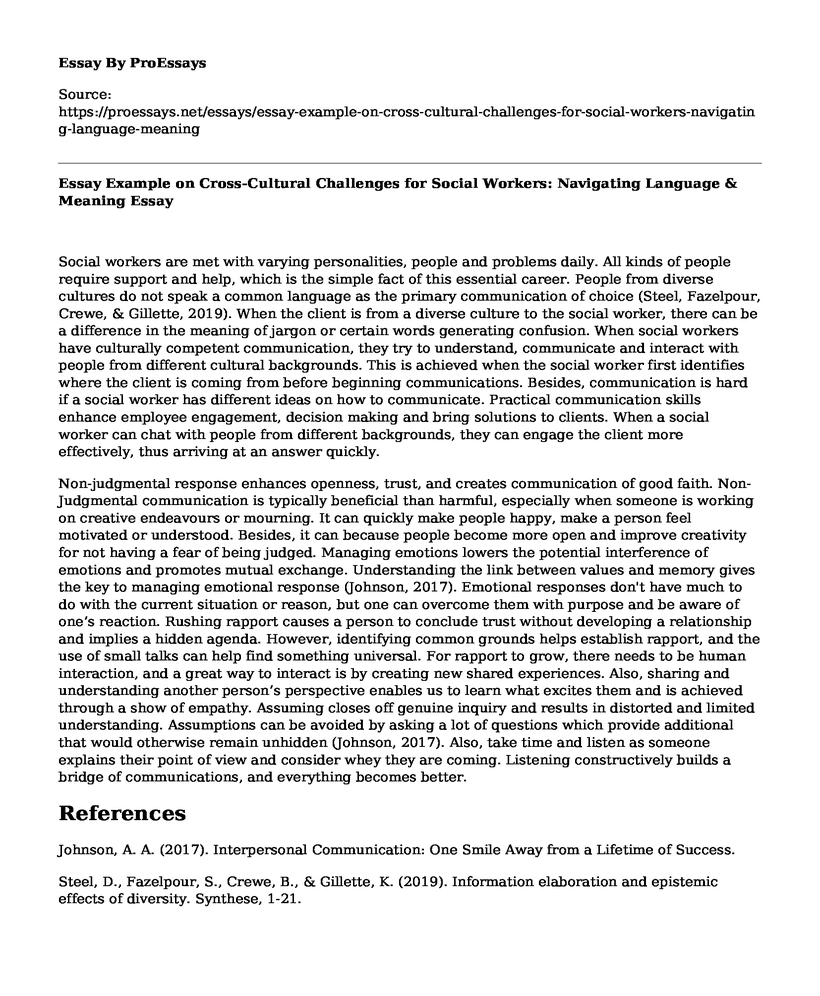Social workers are met with varying personalities, people and problems daily. All kinds of people require support and help, which is the simple fact of this essential career. People from diverse cultures do not speak a common language as the primary communication of choice (Steel, Fazelpour, Crewe, & Gillette, 2019). When the client is from a diverse culture to the social worker, there can be a difference in the meaning of jargon or certain words generating confusion. When social workers have culturally competent communication, they try to understand, communicate and interact with people from different cultural backgrounds. This is achieved when the social worker first identifies where the client is coming from before beginning communications. Besides, communication is hard if a social worker has different ideas on how to communicate. Practical communication skills enhance employee engagement, decision making and bring solutions to clients. When a social worker can chat with people from different backgrounds, they can engage the client more effectively, thus arriving at an answer quickly.
Non-judgmental response enhances openness, trust, and creates communication of good faith. Non-Judgmental communication is typically beneficial than harmful, especially when someone is working on creative endeavours or mourning. It can quickly make people happy, make a person feel motivated or understood. Besides, it can because people become more open and improve creativity for not having a fear of being judged. Managing emotions lowers the potential interference of emotions and promotes mutual exchange. Understanding the link between values and memory gives the key to managing emotional response (Johnson, 2017). Emotional responses don't have much to do with the current situation or reason, but one can overcome them with purpose and be aware of one’s reaction. Rushing rapport causes a person to conclude trust without developing a relationship and implies a hidden agenda. However, identifying common grounds helps establish rapport, and the use of small talks can help find something universal. For rapport to grow, there needs to be human interaction, and a great way to interact is by creating new shared experiences. Also, sharing and understanding another person’s perspective enables us to learn what excites them and is achieved through a show of empathy. Assuming closes off genuine inquiry and results in distorted and limited understanding. Assumptions can be avoided by asking a lot of questions which provide additional that would otherwise remain unhidden (Johnson, 2017). Also, take time and listen as someone explains their point of view and consider whey they are coming. Listening constructively builds a bridge of communications, and everything becomes better.
References
Johnson, A. A. (2017). Interpersonal Communication: One Smile Away from a Lifetime of Success.
Steel, D., Fazelpour, S., Crewe, B., & Gillette, K. (2019). Information elaboration and epistemic effects of diversity. Synthese, 1-21.
Cite this page
Essay Example on Cross-Cultural Challenges for Social Workers: Navigating Language & Meaning. (2023, Aug 28). Retrieved from https://proessays.net/essays/essay-example-on-cross-cultural-challenges-for-social-workers-navigating-language-meaning
If you are the original author of this essay and no longer wish to have it published on the ProEssays website, please click below to request its removal:
- Paper Example on African American History, Literature, and the Harlem Renaissance
- Visiting the Ancestors and Family History Essay
- Community Action Service Awareness: How Sports Affect Student's Life Essay
- Essay Example on Marijuana, Hemp, Cannabis: What's the Difference?
- Essay Sample on Traditional to Modern: The Transition of Chinese and Pakistani Weddings
- Disabled Children & Physical Activity: Improving Quality of Life - Research Paper
- Essay Sample on Vasectomy: Making the Difficult Decision of Permanent Sterilization







